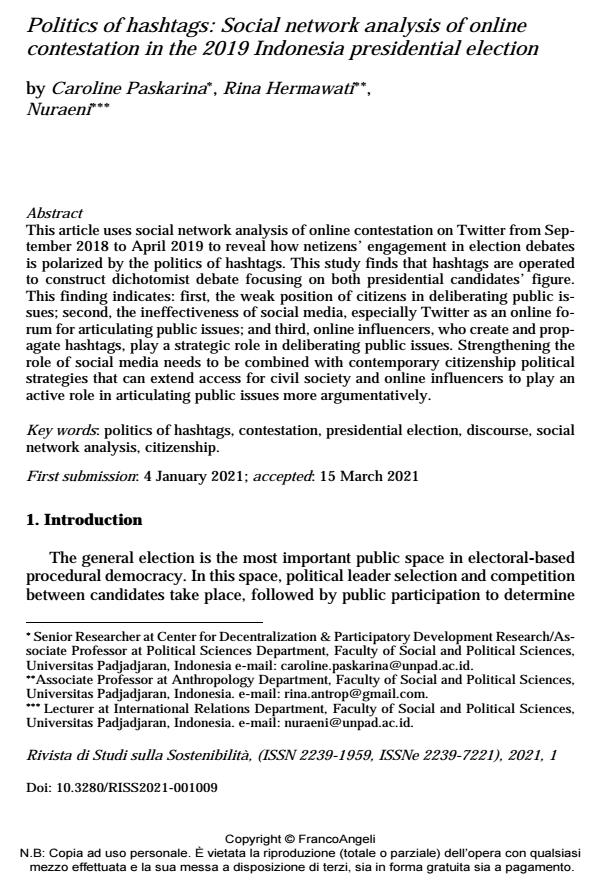Politics of hashtags: Social network analysis of online contestation in the 2019 Indonesia presidential election
Journal title RIVISTA DI STUDI SULLA SOSTENIBILITA'
Author/s Caroline Paskarina, Rina Hermawati Nuraeni
Publishing Year 2021 Issue 2021/1
Language English Pages 20 P. 151-170 File size 489 KB
DOI 10.3280/RISS2021-001009
DOI is like a bar code for intellectual property: to have more infomation
click here
Below, you can see the article first page
If you want to buy this article in PDF format, you can do it, following the instructions to buy download credits

FrancoAngeli is member of Publishers International Linking Association, Inc (PILA), a not-for-profit association which run the CrossRef service enabling links to and from online scholarly content.
This article uses social network analysis of online contestation on Twitter from September 2018 to April 2019 to reveal how netizens’ engagement in election de-bates is polarized by the politics of hashtags. This study finds that hashtags are operated to construct dichotomist debate focusing on both presidential candi-dates’ figure. This finding indicates: first, the weak position of citizens in deliberat-ing public issues; second, the ineffectiveness of social media, especially Twitter as an online forum for articulating public issues; and third, online influencers, who create and propagate hashtags, play a strategic role in deliberating public issues. Strengthening the role of social media needs to be combined with contemporary citizenship political strategies that can extend access for civil society and online influencers to play an active role in articulating public issues more argumentative-ly.
Keywords: politics of hashtags, contestation, presidential election, discourse, so-cial network analysis, citizenship.
- Guarding the people’s vote: why ethics dimension matters for public trust to E-recapitulation in the Indonesia 2024 election Caroline Paskarina, Mustabsyirotul Ummah Mustofa, Rina Hermawati, Eddy Nurmanto, Rangga Wardana, in Cogent Social Sciences 2586372/2025
DOI: 10.1080/23311886.2025.2586372 - Analysis and mining of an election-based network using large-scale twitter data: a retrospective study Amartya Chakraborty, Nandini Mukherjee, in Social Network Analysis and Mining 74/2023
DOI: 10.1007/s13278-023-01081-0 - Sosyal Medyanın Seçmenlerin Siyasal Kararlarına Etkileri Üzerine Bir Etkileşim Araştırması: 14 Mayıs 2023 Cumhurbaşkanlığı Seçimleri Twitter İçerik Analizi Gökhan Gürbüz, İdil Sayımer, in Elektronik Cumhuriyet İletişim Dergisi /2024 pp.38
DOI: 10.54089/ecider.1488943 - Public Trust in the Time of Pandemic: An Analysis of Social Networks in the Discourse of Large-Scale Social Restrictions in Indonesia Caroline Paskarina, in Social Sciences /2023 pp.186
DOI: 10.3390/socsci12030186
Caroline Paskarina, Rina Hermawati Nuraeni, Politics of hashtags: Social network analysis of online contestation in the 2019 Indonesia presidential election in "RIVISTA DI STUDI SULLA SOSTENIBILITA'" 1/2021, pp 151-170, DOI: 10.3280/RISS2021-001009